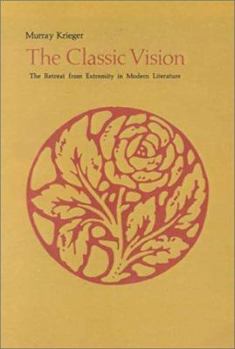The Classic Vision: The Retreat from Extremity in Modern Literature
Select Format
Select Condition 
Book Overview
In an earlier book Professor Krieger discussed the tragic vision as the confrontation with extremity--the writer's commitment to a master metaphor even as he acknowledges the incompleteness of that metaphor. The term classic is used here to indicate the sense of restraint, of acceptance, of coming to terms with limitations self-imposed--as well as the awareness of the alternative one rejects in turning away from self-indulgence. The writer is thus viewed as one who accepts the common use of language while he endeavors to defy it through metaphor, one who accepts classically the common lot of man whereas his tragic impulse would lead him to reject it.
Professor Krieger begins with the Renaissance lyric, which for him represents both the last moment of union and the first moment of collision between the classic and tragic visions in literature. He then moves through poems, novels, and a play, ranging in time from the eighteenth to the twentieth century, and delineates four kinds of retreat from extremity.
In the works of Pope and Samuel Johnson he finds retreat through the worship of bloodless abstractions. The second form of retreat is the embrace of the natural human community, and the focus is on Wordsworth, George Eliot, Jane Austen, and Anthony Trollope. Through analyses of Sterne's Tristram Shandy, Robert Penn Warren's All the King's Men, and works by Swift, Professor Krieger demonstrates retreat through acceptance of the human barnyard. The final form of retreat, through an alternative to sainthood, is shown in Faulkner's Light in August and T. S. Eliot's Murder in the Cathedral.
In each case, Professor Krieger finds, by analyzing the pervading metaphor one is confronted with a counter-metaphor that mysteriously asserts itself: The metaphors may have been unmetaphored, but they remain forms of imagination that constitute a reality, though it is now seen as imperfect. As such forms, the metaphors sustain us still. And that is perhaps the most classic notion of all.





